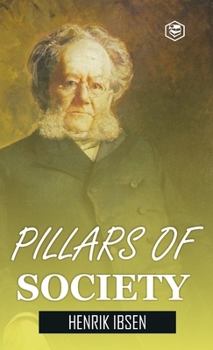Pillars of Society (Hardcover Library Edition)
Select Format
Select Condition 
Book Overview
The arrival of Karsten Bernick's brother-in-law leads to a series of revelations, exposing a tumultuous history that could destroy his marriage and thriving business empire. To ensure his future,... This description may be from another edition of this product.
Format:Hardcover
Language:English
ISBN:9362059746
ISBN13:9789362059741
Release Date:April 2024
Publisher:Sanage Publishing House Llp
Length:168 Pages
Weight:0.80 lbs.
Dimensions:0.5" x 5.5" x 8.5"
Customer Reviews
1 rating
What is it that maintains society?
Published by Thriftbooks.com User , 15 years ago
Who or what are the "pillars of society"? The Jewish ethical work called Ethics of the Fathers 1:2 reports that Simon the Just said that the earth endures because of three things, two of which are religious: "Torah, divine worship, and acts of loving-kindness." However, in 1:18 of the same volume, Rabban Shimon ben Gamliel offers a practical idea, "the world rests on three things: truth, justice, and peace." Henrik Ibsen has a similar view. The protagonist in this excellent play is Bernick, is a highly respected owner of a ship building business. Bernick lives in a society that he controls because of his wealth and the prestige that wealth produces. He donated many items to his community and placed his name on them. At one point in the play there is a mass demonstration of citizens praising him. But Ibsen shows us why we should despise him. Bernick insists that his community follow the traditional ways, meaning the behavior that the masses sanctioned for some generations, notions that they read into the Bible although a fair reading would not find them, ideas that stagnate human development and societal advancement, thoughts that enlightened people reject. He views women as inferior to men, childlike, foolish, unable to understand, beings that should be subservient to men. He talks down to his wife during the few times that he talks to her. Outrageously, he says to her at one point, as if he were speaking to a wall, I have no one to talk to. Dina, a young woman who he squashes because of his view of women, says that her life in this city is "so proper and so moral" that it is impossible to live with these people. Lona, another character, comes to Bernick's house, to "let in fresh air." Ibsen shows that Bernick is a hypocrite, a liar, a crook, a man who intends, in a Bernie Madoff fashion, to steal from people who trust him, a man who could care less about seeing people die if he can make money. He persuaded a close relative into taking the blame for one of his crimes, and this individual suffered for more than a decade because of it. Ibsen ends his book by saying that the true builders of society are not people, but "the spirit of truth and the spirit of freedom," the very things that Bernick squashed.





